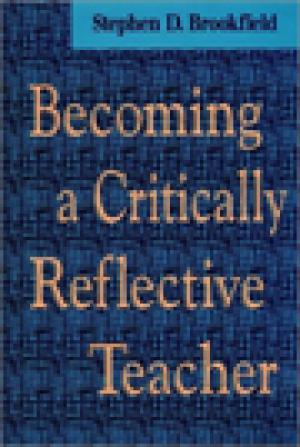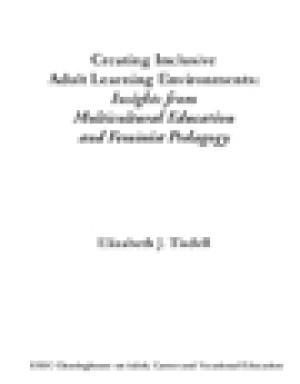Resources

At what price entry? Philosopher of education Jane Roland Martin contends that feminist scholars have traded in their idealism for a place in the academy. In Coming of Age in Academe, she looks at the ways that academic feminists have become estranged from women. Determining that this is the "membership fee" the academy exacts on all its members, she calls for the academy's transformation. Part one explores the chilly research climate for feminist scholars, the academic traps of essentialism and aerial distance, and the education gap in the feminist text. In part two, Martin likens the behavior of present-day feminist scholars to nineteenth-century immigrants to the United States and examines their assimilation into the world of work, politics and the professions. She finds that when you look at higher education, you see what a brutal filter of women it is. Part three highlights the academy's "brain drain" and its containment of women and then proposes actions both great and small that aim at fundamental change. In this rousing call to action, Martin concludes that the dissociation from women that the academy demands--its "entrance fee"--can only be stopped by radically reforming the gendered system on which the academy is based. (From the Publisher)

In her remarkable new book, The Time Bind, Arlie Hochschild brings us startling news of the ways in which home is being invaded by the time pressures and efficiencies of work, while the workplace is, for many parents, being transformed into a strange kind of surrogate home. For three years at a Fortune 500 company, she interviewed everyone from top executives to factory hands, sat in on business meetings, followed sales teams onto golf courses, and trailed working parents and their children through their days. In a series of vivid portraits, Hochschild paints a surprising picture of couples as time thieves, children as emotional bill-collectors, spouses as efficiency experts, parents who feel like helpful mothers and fathers mainly to their workmates, and women who - like generations of men before them - flee the pressures of home for the relief of work. Hochschild's groundbreaking study exposes our crunch-time world and reveals how, after the first shift at work and the second at home, comes the third, and hardest, shift of repairing the damage created by the first two. (From the Publisher)

The economy uncertain, education in decline, cities under siege, crime and poverty spiraling upward, international relations roiling: we look to leaders for solutions, and when they don't deliver, we simply add their failure to our list of woes. In doing do, we do them and ourselves a grave disservice. We are indeed facing an unprecedented crisis of leadership, Ronald Heifetz avows, but it stems as much from our demands and expectations as from any leader's inability to meet them. His book gets at both of these problems, offering a practical approach to leadership for those who lead as well as those who look to them for answers. Fitting the theory and practice of leadership to our extraordinary times, the book promotes a new social contract, a revitalization of our civic life just when we most need it. Drawing on a dozen years of research among managers, officers, and politicians in the public realm and the private sector, among the nonprofits, and in teaching, Heifetz presents clear, concrete prescriptions for anyone who needs to take the lead in almost any situation, under almost any organizational conditions, no matter who is in charge, His strategy applies not only to people at the top but also to those who must lead without authority--activists as well as presidents, managers as well as workers on the front line. (From the Publisher)

A leading MIT social scientist and consultant examines five professions—engineering, architecture, management, psychotherapy, and town planning—to show how professionals really go about solving problems. (From the Publisher)

Journal Issue.

Journal Issue.
Designed as a resource for persons interested in improving the quality of teaching and student learning, this book covers aspects of the teaching-learning process that can be altered with relative ease. Practical suggestions are given in chapters focusing on concepts known to have a strong influence on student learning. The chapters include: (1) new ideas on teaching and learning in higher education; (2) exceptionally effective college teachers (identifying and interviewing them, feedback, etc.); (3) learning and evaluation (traditional and alternative uses, critical elements, subject area differences, etc.); (4) mastery learning; (5) motivation and early success (predicting college success, importance of first semester and first test, etc.); (6) time use and student involvement (John Carroll's model, Benjamin Bloom's ideas on learning rate, allocated versus engaged time, etc.); (7) student support services (faculty contact, tutorial services, computer-assisted instruction, etc.); and (8) staff development (collegial sharing, program characteristics, etc.).

Building on the insights of his highly acclaimed earlier work, The Skillful Teacher, Stephen D. Brookfield offers a very personal and accessible guide to how faculty at any level and across all disciplines can improve their teaching. Applying the principles of adult learning, Brookfield thoughtfully guides teachers through the processes of becoming critically reflective about teaching, confronting the contradictions involved in creating democratic classrooms, and using critical reflection as a tool for continuous personal and professional development. (From the Publisher)

Adult educators are increasingly faced with the task of creating and facilitating learning activities for participants from diverse backgrounds. They need to take into account the needs of both male and female learners, learners of different ethnic and racial groups, and learners from different social backgrounds in creating an inclusive adult learning environment. The developing body of literature on multicultural concerns in adult education, on feminist theory and on critical and feminist pedagogies offer some insights in this regard. This publication aims to: (1) synthesise some of the work related to inclusivity and diversity that has already been done in the field of adult education; and (2) examine aspects of the wider literature base on multicultural education and feminist theory and pedagogy that can offer insights specifically for creating inclusive adult learning environments. (From the Publisher)